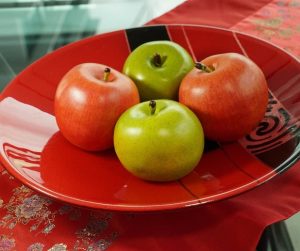 It looked so real. When I was young, we had a beautiful bowl of waxed fruit on our coffee table. It was shiny and pretty. Our real fruit looked beautiful too, on the day we bought it, and possibly the day after. But that wax fruit was perfect and smooth to the touch, and it never spoiled. It looked so good, that eventually, my little brother did try it. The bite marks he left in the wax apple became a funny topic of conversation. But mostly, the apple with bite marks just remained in the bowl with the shiny pretty side face up so the bite mark side was hidden from view.
It looked so real. When I was young, we had a beautiful bowl of waxed fruit on our coffee table. It was shiny and pretty. Our real fruit looked beautiful too, on the day we bought it, and possibly the day after. But that wax fruit was perfect and smooth to the touch, and it never spoiled. It looked so good, that eventually, my little brother did try it. The bite marks he left in the wax apple became a funny topic of conversation. But mostly, the apple with bite marks just remained in the bowl with the shiny pretty side face up so the bite mark side was hidden from view.
As an adult, when I would visit my parents, I would see that same bowl of wax fruit on the coffee table. Although it might have a slight layer of dust on it at times, it still looked good. It had faded some over the years, but it still looked like something you could take a bite out of, and sure enough, if you turned the apple over, there were the bite marks.
During one visit to my see my Mom and Dad, I sat on the sofa, by the bowl of beautiful fruit and started thinking that so many things that appear real, seem so amazing (like fruit that doesn’t spoil, I mean who wouldn’t love that) or sound good, and often too good to be true are actually fake.
I thought about the people in my life who had fooled me. They presented one thing, but in reality, they were not that at all. There was the boyfriend who made all kinds of promises, but did not keep a single one. There was the girl I worked with at the bank who gained my trust, became my friend outside of work, for the purpose of stealing money to then blame it on me.
Some things that are fake are very obvious of course. That Rolex for $25 or that designer handbag for $45, as opposed to $400, is of course, a fake. Of course, the person selling it and the person buying it know that and are alright with it. Personally, I do not understand the desire, but in some ways, if people selling and buying fake information know it’s fake, it is somewhat harmless.
But, what about the important things? Marriage, for example, you want to know it’s real for both people involved. You want to know that the person you are vowing to do life with is as committed as you are, and the only way to know is to have some solid real life experiences and some deep conversations, and of course it takes time to really know if you are with someone who honors their commitments even when life is hard.
What about religion? I grew up in a religious family, and believed everything our church taught. Although there were things that seemed questionable, I also sensed that it was not my right to question. I was supposed to just believe it all. We had religious leaders, and they were the ones who were knowledgeable. They were the ones who knew everything about God. My job was to follow the rules, without question.
It was only after I experienced a lot of hurt at the hands of “religious” people that I started to question religion. I started to question everything. I wanted truth. I did not want to be misled by those in positions of power, religious or otherwise. I just wanted to know the truth and make up my own mind.
It was then that I really discovered the source of truth. The Bible, which I thought was just an ancient religious book that religious leaders can understand and use, is actually written as a guide for life.
But, how do we know it’s true? According to Got questions.org, “Where we can check biblical claims against verifiable truth, the Bible proves itself accurate. History, archaeology, science, and philosophy have shown Scripture to be factual and consistent. This correspondence between various forms of evidence is a major advantage the Bible has over the scriptures of any other faith system. In many cases, it has been the deciding factor in converting skeptics and nonbelievers to faith in Christ.” “More so than with any other religious text, we have assurance that the Bible is true. The combination of internal consistency, connection to evidence, and relevance to our experience make the Bible unique among books. Like many religious works, the Bible claims to be true (2 Timothy 3:16). Unlike any other religious work, the Bible emphatically supports that assertion.
These days our family purchases fruit and vegetables from a company called “misfits market” Although I know I’m not in danger of trying to take a bite out of fake fruit, I also recognize that some of the fruit in the grocery store has a layer of something coating it that makes it shiny and pretty. I very much prefer the realness of the misfit fruit, the fruit that didn’t make it to market due to its flaws, but in reality is the real thing.


